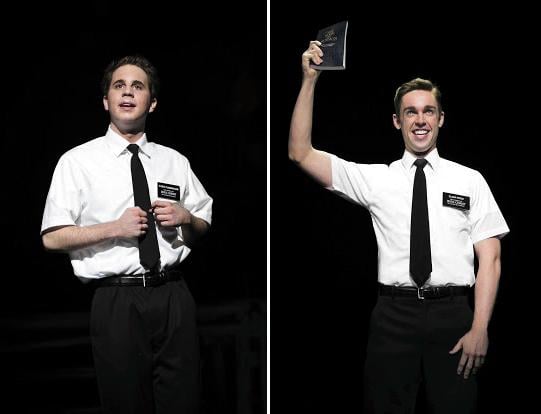
Since its arrival in Chicago in December, Tony Award-winning musical “The Book of Mormon” has garnered feedback from enamored theater lovers and appalled conservatives alike. The show, written by the creators of “South Park,” tells the story of a pair of amateur Mormon missionaries, Elder Cunningham (Ben Platt) and Elder Price (Nic Rouleau), who are sent on a two-year mission to convert a diseased and impoverished Ugandan village to the Book of Mormon. On their way, they get into hilariously inappropriate situations that ultimately teach them about friendship and acceptance. The Current talked with the show’s stars to discuss “South Park,” Disney World and the power of Mormonism.
What did you know about Mormonism before you were cast, and how has being in the show impacted that knowledge?
Ben Platt: I grew up really close to a really beautiful Mormon church. But that was all I knew about it, that they had a big beautiful church. I didn’t really know anyone that was Mormon. The first time I learned about Mormonism was in the “South Park” episode about Mormons. I knew they’re the guys who ring doorbells, the very basic.
Nic Rouleau: I did grow up down the street from a big Mormon church. And the show I did before Mormon was “Legally Blonde,” and the girl I played opposite was a practicing full-time Mormon. She actually read me passages from the Book of Mormon on the way to my auditions for the show — maybe trying to save me, I’m not sure. Obviously, my knowledge has grown since starting the show, especially about the missions and what the missionaries have to do when they go abroad.
Some people have been offended by “The Book of Mormon.” Where do you see the line between comedy and insult?
BP: All of the fun they poke at Mormons comes from a narrative place and a character place. I find things offensive when the jokes are for the sake of the jokes. It’s all from a place of just wanting to make a funny narrative and characters that you can get on board with … At the end of the day they’re portrayed as really nice, good-hearted guys.
NR: They didn’t set out writing the show to be like “we want to make fun of Mormonism.” The thing about Matt and Trey is they’re equal-opportunity offenders. Everybody is fair game. And you see that in the show. We don’t just make fun of Mormons. I don’t think we actually ever do make fun of Mormons.
If you guys were actually Mormon missionaries, where would you want to go for your two years?
BP: Italy.
NR: Actually, a lot like (Elder) Kevin Price, I really wouldn’t mind going to Orlando. I’m not really acting when I sing about how much I love Orlando on stage because I really do like Orlando. It’s wonderful.
Nic, is it difficult to play Kevin Price? He’s kind of self-obsessed.
Act one Kevin Price is very different from me. He’s very confident, very sure of himself and kind of a dick. The challenge of Elder Price is being confident but still being relatable, likable to the audience. Because I think he can easily turn into the douchebag that no one really roots for, and you still need to root for him even in the moments when he’s being mean to Elder Cunningham. It’s a really fine balance.
Ben, both in this show and in “Pitch Perfect,” you play an awkward, socially outcast guy. What do you draw on for that?
A lot of people ask if I’m really a nerd, especially since these two roles have come consecutively. To be honest, I don’t think I’m really that much like him. I’m nerdy about certain things, like musical theater. And I’m really unathletic. I focus on the aspect of how much he wants to be accepted by everyone. Everyone can relate to just wanting to fit in and have friends and be accepted. So I started from there.
What advice do you have for Northwestern’s aspiring actors?
BP: I attribute the fact that I am able to do this show to the fact that ever since I was really young I’ve been on stage and performing and never second-guessed that I wanted to do it. There’s such value in never looking back. Just making sure your heart is always set on it. That’s the most important thing.
NR: Be the actor you would want to work with, both on and off the stage. When you come across someone like Ben, who’s so easygoing and easy to work with, you just want to hire them again. And directors, and casting directors, and producers, they pay attention to that and notice that. When you get to New York, the plain and simple truth is everybody’s talented, so what sets you apart is how you are as a person.

